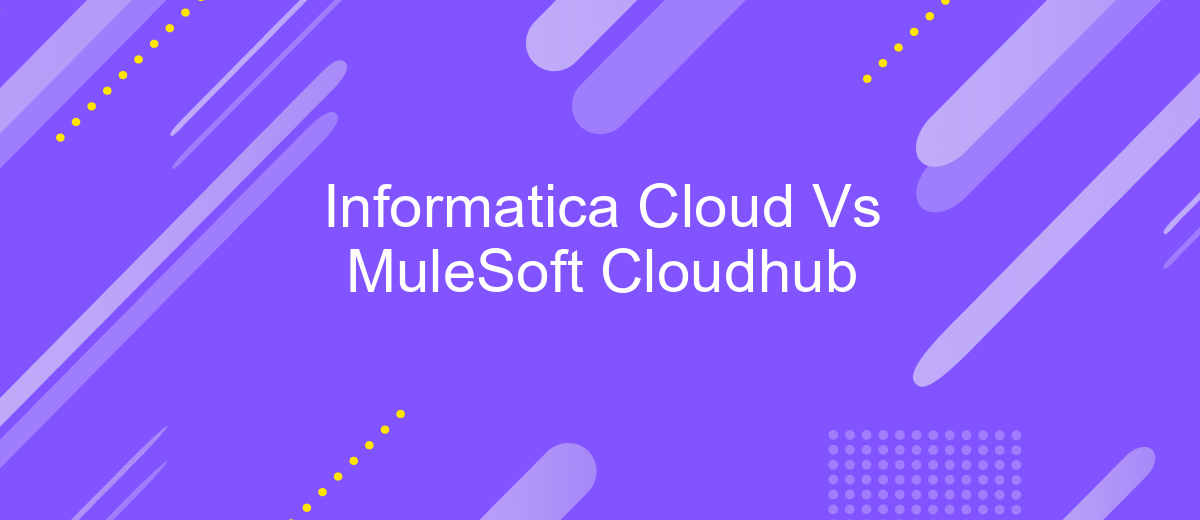Informatica Cloud Vs MuleSoft Cloudhub
In today's rapidly evolving digital landscape, choosing the right cloud integration platform is crucial for businesses aiming to streamline their operations and enhance agility. This article delves into a comparative analysis of two leading solutions: Informatica Cloud and MuleSoft CloudHub. By examining their features, capabilities, and use cases, we aim to provide insights that will help organizations make informed decisions tailored to their specific integration needs.
Introduction
In the rapidly evolving landscape of cloud integration, choosing the right platform is crucial for business success. Informatica Cloud and MuleSoft Cloudhub are two leading solutions that offer robust features to streamline data integration and management. Both platforms provide unique capabilities that cater to different business needs and technical requirements.
- Informatica Cloud: Known for its comprehensive data integration and data management services.
- MuleSoft Cloudhub: Renowned for its API-led connectivity and ease of building application networks.
- ApiX-Drive: A versatile tool that simplifies the integration process by connecting various applications and automating workflows.
Understanding the strengths and limitations of each platform can help organizations make informed decisions. This article aims to compare Informatica Cloud and MuleSoft Cloudhub, highlighting their key features, benefits, and potential drawbacks. Additionally, we'll explore how ApiX-Drive can complement these platforms by offering seamless integration capabilities.
Key Features and Benefits

Informatica Cloud offers an intuitive, user-friendly interface that simplifies data integration across various platforms. It supports a wide range of data sources and applications, ensuring seamless connectivity and real-time data synchronization. Its advanced data transformation capabilities, combined with robust security features, provide a reliable and efficient solution for managing complex data workflows. Additionally, Informatica Cloud's scalability ensures that businesses can grow without worrying about data integration bottlenecks.
MuleSoft Cloudhub, on the other hand, excels in providing a comprehensive API management platform. It enables businesses to design, build, and manage APIs with ease, facilitating smooth communication between different systems. Cloudhub's Anypoint Platform ensures high availability and scalability, making it ideal for large enterprises. Moreover, its pre-built connectors and templates accelerate the integration process, reducing the time and effort required for deployment. For those looking to further streamline their integration processes, services like ApiX-Drive can be a valuable addition, offering automated data transfer and synchronization between various applications and systems.
Integration Capabilities

When comparing Informatica Cloud and MuleSoft Cloudhub, it's essential to evaluate their integration capabilities. Both platforms offer robust solutions for connecting various applications and data sources, but their approaches and features can differ significantly.
- Informatica Cloud: Known for its extensive data integration tools, Informatica Cloud provides pre-built connectors, advanced data transformation capabilities, and real-time data synchronization. It supports a wide range of data formats and protocols, making it suitable for complex integration scenarios.
- MuleSoft Cloudhub: MuleSoft Cloudhub excels in API-led connectivity, offering a versatile platform for building, deploying, and managing APIs. It provides a rich set of connectors and tools for seamless integration, along with robust support for microservices and event-driven architectures.
- ApiX-Drive: For those seeking a user-friendly integration solution, ApiX-Drive offers an intuitive interface for connecting various applications without extensive coding. It supports a wide range of popular apps and services, making it an excellent choice for businesses looking to streamline their integration processes.
Ultimately, the choice between Informatica Cloud and MuleSoft Cloudhub depends on your specific integration needs and technical requirements. While Informatica Cloud is ideal for data-centric integrations, MuleSoft Cloudhub is better suited for API-driven approaches. ApiX-Drive, on the other hand, provides a simpler, more accessible option for quick and easy integrations.
Pricing and Support

When comparing pricing between Informatica Cloud and MuleSoft Cloudhub, it's important to consider the different pricing models and support options each offers. Informatica Cloud generally operates on a subscription-based model, with pricing tiers based on the number of users and the volume of data processed. MuleSoft Cloudhub, on the other hand, offers a more flexible pricing structure that can scale according to the specific needs of the business.
Both platforms provide extensive support options to ensure smooth operation and integration. Informatica Cloud offers 24/7 customer support, detailed documentation, and a dedicated account manager for enterprise clients. MuleSoft Cloudhub also provides 24/7 support but includes additional resources like a community forum and extensive training materials.
- Informatica Cloud: Subscription-based pricing, 24/7 support, dedicated account manager.
- MuleSoft Cloudhub: Flexible pricing, 24/7 support, community forum, extensive training materials.
For businesses looking to streamline their integration processes, additional tools like ApiX-Drive can be invaluable. ApiX-Drive offers a user-friendly platform to automate data transfer between various services, reducing the need for manual intervention and ensuring seamless integration. This can be particularly beneficial for companies using either Informatica Cloud or MuleSoft Cloudhub, as it enhances their overall efficiency and operational capabilities.
Conclusion
In conclusion, both Informatica Cloud and MuleSoft Cloudhub offer robust solutions for cloud integration, each with its own unique strengths. Informatica Cloud excels in data integration and management, providing a user-friendly interface and powerful data processing capabilities. On the other hand, MuleSoft Cloudhub stands out with its API-led connectivity and extensive support for various integration patterns, making it a versatile choice for complex, multi-system environments.
Ultimately, the choice between Informatica Cloud and MuleSoft Cloudhub will depend on your specific needs and integration requirements. For businesses seeking a straightforward, data-centric approach, Informatica Cloud may be the better fit. Conversely, if your organization requires a flexible, API-first strategy, MuleSoft Cloudhub could be more advantageous. Additionally, services like ApiX-Drive can further streamline the integration process, offering a seamless way to connect various applications and automate workflows, enhancing the overall efficiency of your integration strategy.
- Automate the work of an online store or landing
- Empower through integration
- Don't spend money on programmers and integrators
- Save time by automating routine tasks
FAQ
What are the primary differences between Informatica Cloud and MuleSoft Cloudhub?
Which platform is better suited for real-time data integration?
Can both platforms handle big data integration?
Which platform is easier to use for non-technical users?
Are there any third-party services that can help with automation and integration setup for these platforms?
Apix-Drive will help optimize business processes, save you from a lot of routine tasks and unnecessary costs for automation, attracting additional specialists. Try setting up a free test connection with ApiX-Drive and see for yourself. Now you have to think about where to invest the freed time and money!


